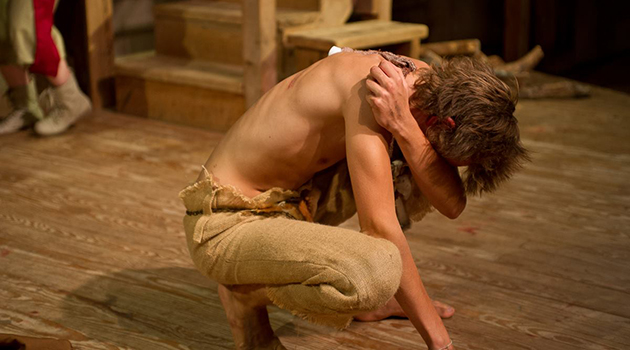What I Learned at Winedale: Connor Healy
Posted May 14, 2014
By Connor Healy in Scholarships

College transforms you in ways you can't predict. In this essay, Forty Acres scholar Connor Healy reflects on his time with the UT Shakespeare at Winedale program.
The air at Winedale buzzes with Shakespeare. The wind hums soliloquies. The leaves dance to the rhythm of the verse. Shakespeare’s text has been spoken into the space for over 30 years, and the trees and the ground have absorbed those words, those breaths.
Shakespeare at Winedale’s Summer 2013 program began before we breathed that electric air, before we laid our feet on that sacred soil. In the weeks leading up to our departure for Winedale, we read and discussed the four plays we would produce: The Comedy of Errors, King Henry IV, Part I, The Tempest, and Christopher Marlowe’s Doctor Faustus (this summer was, in fact, the first time a Marlowe play had been produced at Winedale). We had to memorize all our lines in those preceding weeks, allowing us to begin playing immediately when we got to Winedale and also forcing us to spend time with our characters and begin to develop a relationship with them.
The first four weeks at Winedale were an exhilarating whirlwind. One play per week. Beginning on Sunday, we would work on a play for 10-12 hours per day: running scenes, making costumes and props, choreographing fights, analyzing text and characters. Our work culminated each week with a performance for Winedale alumni on Saturday evening.
Winedale’s church, its temple, is the barn. The barn was our play space for our nine weeks out there. I first noticed its smell: earthy, damp, musky, ancient yet fresh, rich with stories and life. In it we learned, we grew, we explored, we questioned, we provoked and were provoked, challenged and were challenged. The barn is the nucleus of Winedale, the site of genesis and epiphany.
After the first four weeks, we had a week and a half to further prepare our plays before four weeks of public performances began. These performance weeks were exhausting yet indescribably rewarding. Tuesday and Wednesday were days to continue developing the plays, including working trouble scenes, solidifying lines, adding props, and adjusting costumes. Thursday and Friday evenings saw one performance each, and Saturday and Sunday each had a matinee and an evening performance. We played six performances per week, for a total of 24 public performances at Winedale. Monday was a much-needed and well-earned day off where we were free to do as we pleased: some would go to Chili’s or Wal-Mart, others would see a movie or drive 45 minutes for enchiladas and fish bowl margaritas. Most Monday evenings we watched the sun set. We read poems, we told stories; we shared.
I played Caliban in The Tempest. He was my largest role, and I spent by far the most time with him. I dived deep into both the text and myself to find his body, his voice, how he moved and walked and danced. The first time I cried at Winedale was when I fully, wholly, radically empathized with Caliban. “And then I lov’d thee.” When I played him, I surrendered my heart to him, and he occupied my soul and my body. I became him, or he became me, or we became one.
Two weeks of touring followed our departure from Winedale. We first performed Comedy in Dallas, then Tempest and Henry IV at UT. Our summer ended with a trip to Staunton, Va., where we performed Doctor Faustus at the American Shakespeare Center’s Blackfriars Playhouse.
I regret to leave out many salient parts that constitute the Winedale experience: playing volleyball, singing before meals, sweeping the barn. The things I carry with me from Winedale, however, are those that I will carry for a lifetime. I leave, first, with a family, a group of people with whom I share an inexpressible bond. I also leave with a singular love and appreciation for Shakespeare, a love that has seeped within in me and saturated my bones.
Winedale is a place of magic. The birds know. For all these years, the same dirt has held our bodies from floating away into the vast emptiness, the same trees have watched and heard us playing, all the “To be”s and “Never, never”s and “Tomorrow, and”s have been spoken with the same air. It was revelatory and transformative to breathe that air. Shakespeare entered my lungs and filled me, radiating through my every cell. He will forever remain in my breath.
Photo courtesy Connor Healy.